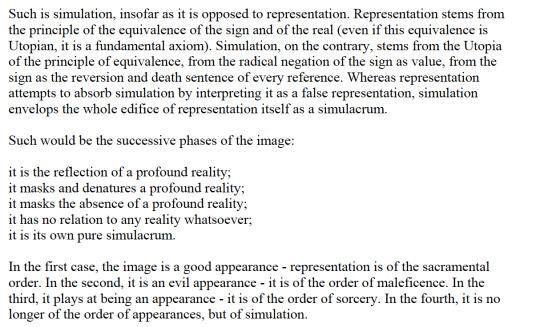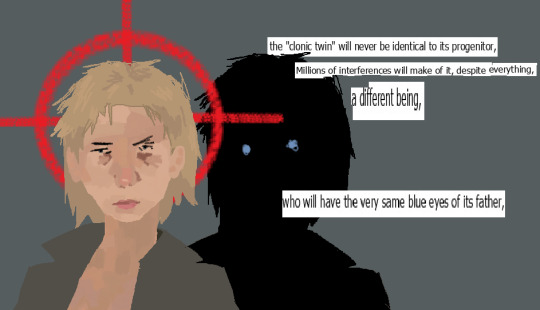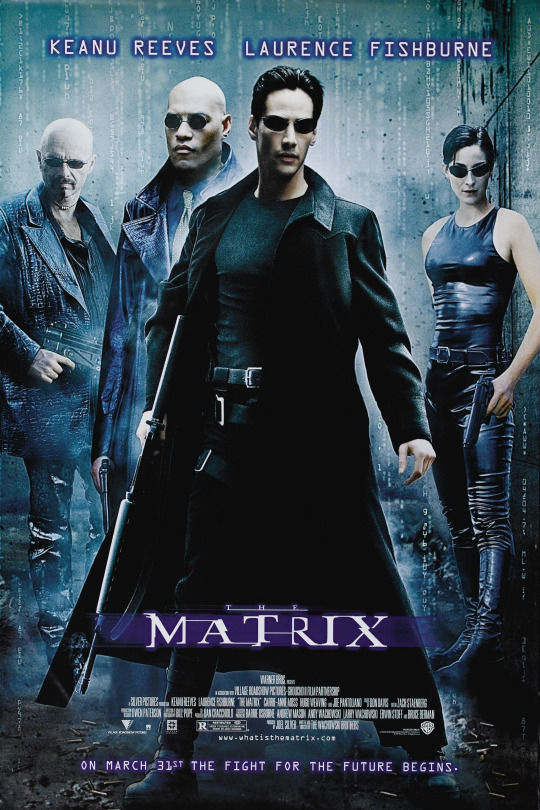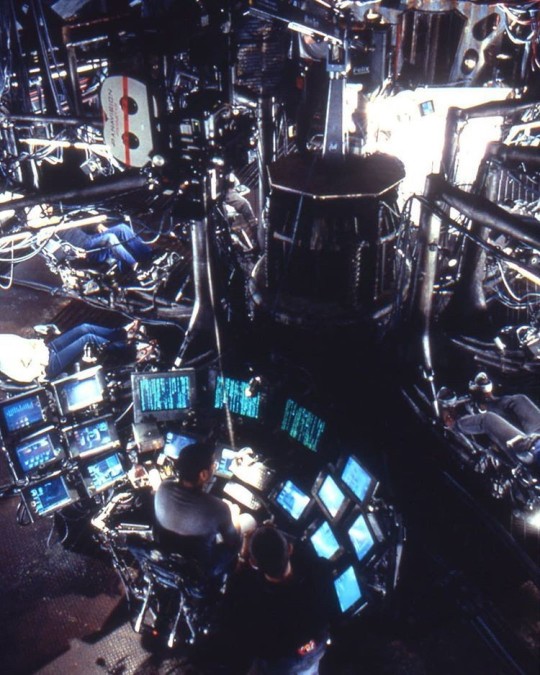#simulacra and simulation
Explore tagged Tumblr posts
Text




Jean Baudrillard. Simulacra and Simulation (trans. Sheila Faria Glaser)
13 notes
·
View notes
Text

true detective & "darkness on the edge of town" by bruce springsteen [on youtube]
#���this place is like somebody’s fading memory of the darkness on the end of town” —rustin cohle probably#dreamcore/nostalgiacore/liminal places/ethereal/esoteric/blood/gore/queen of the gas station/southern gothic/coquette americana/#bruce springsteen#darkness on the edge of town#cw graphic violence#sorry i felt compelled to drag baudrillard into this#simulacra and simulation#true detective#true detective season 1#rust cohle#marty hart#rust and marty#e#my amv#midwest gothic
521 notes
·
View notes
Text


simulacra
#mgs#mgs1#mgsv#metal gear#metal gear solid#liquid snake#simulacra and simulation#baudrillard#metal gear fanart#mgs fanart#elimgsv#mgsv eli
93 notes
·
View notes
Text


This was my Perverts listening set up
#ethel cain#southern gothic#hayden anhedönia#pulldrone#vacillator#punish#midwest#simulacra and simulation#jean baudrillard#amber waves#etienne
104 notes
·
View notes
Quote
Today abstraction is no longer that of the map, the double, the mirror, or the concept. Simulation is no longer that of a territory, a referential being or substance. It is the generation by models of a real without origin or reality: a hyperreal. The territory no longer precedes the map, nor does it survive it. It is nevertheless the map that precedes the territory — precession of simulacra — that engenders the territory.
Jean Baudrillard, Simulacra and Simulation
#abstraction#abstract#reality#virtual#simulation#hyperreal#quotes#Baudrillard#Jean Baudrillard#Simulacra and Simulation
49 notes
·
View notes
Text


"Do You Choose To Glitch Through The Rest Of Your Journey?
>YES
>NO"
Mixed media collage, 2022.
#art#artwork#mixed media#outsider art#surreal art#surrealism#collage#artists on tumblr#illustration#painting#the matrix#video games#Nintendo Power#simulacra and simulation#jean baudrillard#VR
19 notes
·
View notes
Text
Watched The Matrix

First time getting back to this since middle school, so I have a lot of unorganized thoughts rather than a coherent take because there's so much here I hadn't grasped.
- Hugo Weaving gives one of the great performances. His tonalities and facial movements seem completely impossible, and so perfectly blend with the unreality brought on by the visual effects that it's impossible to tell what is him and what isn't (but I think it's mostly him).
- I do think I'm finally ready to actually watch the Dune movies again and for them to click. I expect that watching Stilgar (already the most interesting character) in the context of Morpheus will really elucidate the themes for me so that they finally feel actually interesting.
- On that topic, the seemingly devout religious belief here is really interesting, and I'm excited to go into the sequels again with a better idea of how weird it is that faith in a universal, resurrected savior is so completely rewarded in this one. Neo's closing remark that he's going to show humanity a "world where anything's possible" now indelibly recalls Samuel Delany's Dhalgren, where the protagonist laments that "The miracle of order has run out and I am left in an unmiraculous city where anything may happen". Gonna be thinking about those diametrically opposed viewpoints for a while.
- I do think this is plausibly the single most influential text for our modern understanding of cyberpunk, even moreso than Blade Runner. Ridley Scott's influence is clear here, but it's more Alien than anything else, and the slimier, more integrated sense of transhumanism really resonates. In a sense the genre seems to have gone backwards from something like Neuromancer to this, in that it began plagued by classically existentialist questions which only here are answered with a heavily Kierkegaardian sense of faith. Obviously I have an incomplete perspective on the genre, but it really is surprising how much cyberpunk had to develop before the ideas the Wachowski's come up with here really get put forward.
#movie review#movies#the matrix#the matrix 1999#the wachowskis#lily wachowski#lana wachowski#keanu reeves#laurence fishburne#carrie anne moss#hugo weaving#joe pantoliano#jean baudrillard#simulacra and simulation#cyberpunk#neuromancer#blade runner#alien#dhalgren#existentialism#transhumanism#science fiction#sci fi#science fiction movie#sci fi movies
8 notes
·
View notes
Text

#donnie darko#jake gyllenhaal#2000s movies#william s burroughs#literature#jean baudrillard#simulacra and simulation#queer icons#philsophy
7 notes
·
View notes
Text
“We will live in this world, which for us has all the disquieting strangeness of the desert and of the simulacrum, with all the veracity of living phantoms, of wandering and simulating animals that capital, that the death of capital has made of us—because the desert of cities is equal to the desert of sand—the jungle of signs is equal to that of the forests—the vertigo of simulacra is equal to that of nature—only the vertiginous seduction of a dying system remains, in which work buries work, in which value buries value—leaving a virgin, sacred space without pathways, continuous as Bataille wished it, where only the wind lifts the sand, where only the wind watches over the sand.”
Jean Baudrillard
6 notes
·
View notes
Text


rorschach & "angels of porn" by nicole dollanganger [on youtube]
#(baudrillard posting in honor of perverts)#watchmen#rorschach#nicole dollanganger#female manipulator#alt girl#dark coquette#abandonment issues#sad bbydoll#simulacra and simulation#my amv#e#midwest gothic
14 notes
·
View notes
Text
Azuma - Otaku, Japan's Database Animals
Hey everyone! 🌟
Hiroki Azuma's "Otaku: Japan's Database Animals" looks at postmodern society through the unique perspective of otaku culture. Otaku are people who are crazy about anime, manga, and games. Azuma shows how otaku behaviours reflect the move away from traditional ways of thinking towards new forms of identity.
One important thing about otaku culture is that it's all about derivative works, which fits with Jean Baudrillard's idea of simulacra. This is where the difference between the original and the copy becomes blurred, creating a cycle of self-reference. You can see this in fan markets for shows like Sailor Moon, which show what it's like to live in a postmodern world.
Azuma says that otaku culture is the result of a big change in society, where things like nationalism and religion are losing their power to unite people. Fans create small communities focused on fictional worlds, placing more importance on their own rules than on those of the outside world, and this is part of a bigger move towards local stories.
Azuma suggests that, based on Ōtsuka Eiji's ideas, we should think about consuming media in a different way. He suggests that we should think about consuming media in a way that is more like a database than a hierarchy. Otaku engage with cultural elements like characters, tropes, and settings as interchangeable parts.
Azuma describes otaku as "database animals" because they build their identities using pieces of culture. He uses the hermit crab metaphor to explain how they do this. This is a process where they create "shells" of identity that are always changing by constantly engaging with the culture they are interested in.
Azuma says that otaku don't just escape from reality; they use stories to understand the world around them. They might, for example, talk about ethics or politics by talking about fictional worlds like Gundam. This shows that they are moving away from a single, overarching story to a more diverse and localised way of understanding the world.
Azuma also talks about how otaku culture makes creativity accessible to everyone, allowing fans to become creators and challenging the traditional differences between consumers and producers. Platforms like Comic Market support a peer-to-peer economy, which is similar to Baudrillard's idea of decentralised authorship in a society where there are many copies of everything.
But the decline of grand narratives raises questions about humanism and identity. Otaku culture offers a way of thinking about yourself as a person that is always changing, made up of different parts, but Azuma warns of potential alienation as individuals may get lost in the infinite possibilities of the database.
In summary, Hiroki Azuma's "Otaku: Japan's Database Animals" looks at postmodern life through the lens of Japanese subculture. It shows how otaku's flexible approach to creating meaning challenges modernity and deals with the challenges of today's world. But it also makes us wonder if a society with so many different parts can have the strong connections to stories that we used to have.
2 notes
·
View notes
Video
(via (16) What did Baudrillard think about The Matrix? - YouTube)
5 notes
·
View notes
Photo
This is actually where I'm posting from.

Matrix
2K notes
·
View notes
Text
youtube
#legion fx#i always loved these intros#lots of psychology and philosophy#simulacra and simulation#Youtube
0 notes
Text

Packaging design for Alta Cucina "Naturale" Style Whole Peeled Plum Tomatoes, Stanislaus (n.d.)
0 notes
Text
Simulacra and simulation said it better, but we have already thoroughly debunked the theory of objective reality. Between the double slit and the quantum eraser experiments, the mandala effect, and Hawkings final paper (inspite of his "proclivities") we have a much different understanding of the real now.
Information by itself does not illuminate the world. It can even have the opposite effect. From a certain point onwards, information does not inform — it deforms. We have long since crossed this threshold. The rapid advance of informational entropy, that is, of informational chaos, pushes us into a post-factual society. The distinction between true and false is erased. Information now circulates in a hyper-real space, without any reference to reality. After all, fake news is a kind of information, and one that is possibly even more effective than facts. What counts is short-term effect. Effectiveness replaces truth.
Byung-Chul Han, Non-things: Upheaval in the Lifeworld
135 notes
·
View notes